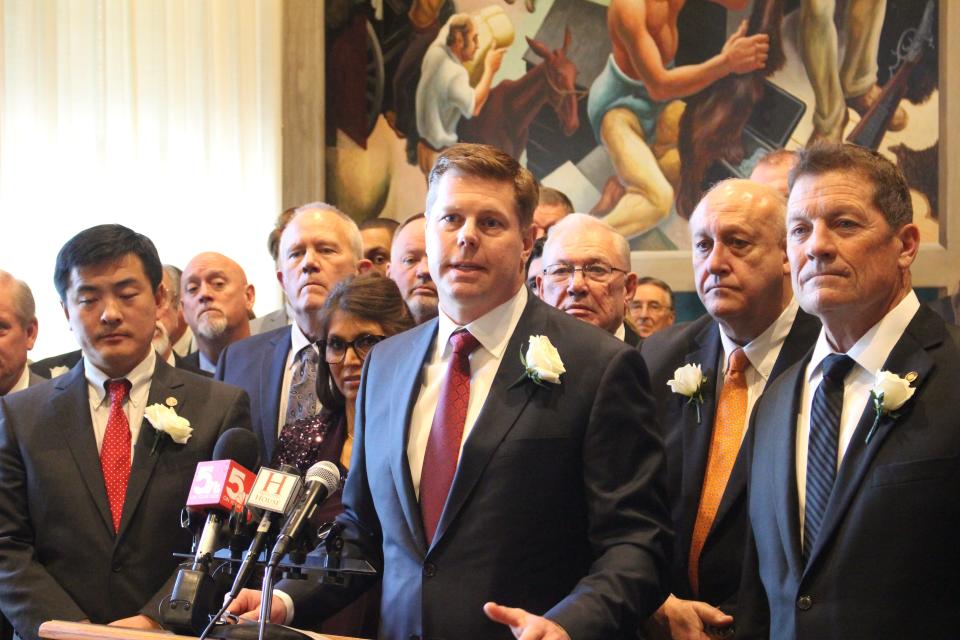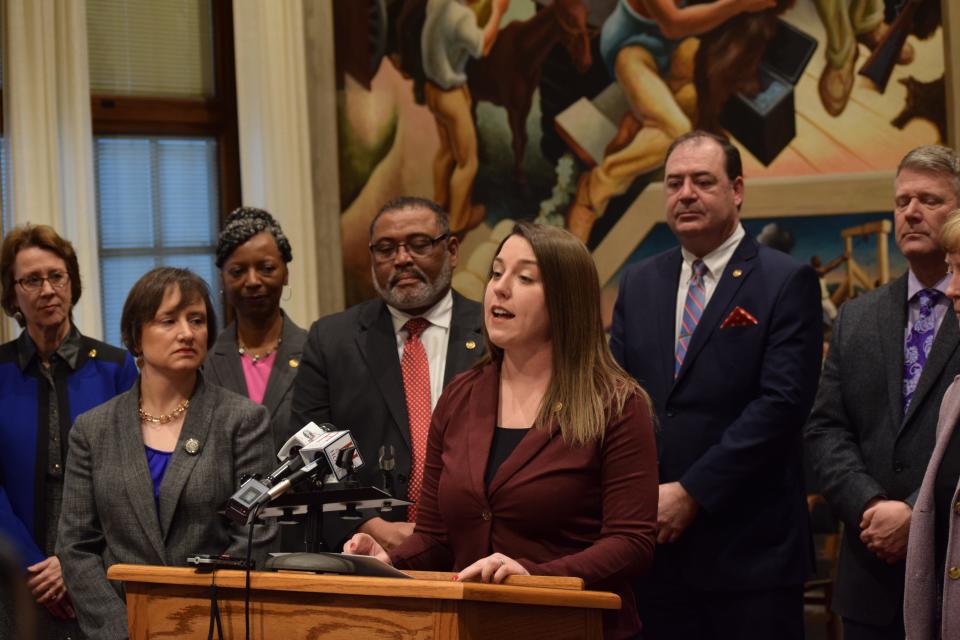Initiative petitions came under fire in 2023. Experts forecast more of the same in 2024.
When the U.S. Supreme Court decided to overturn Roe v. Wade last year, abortion activists in states where the procedure had become illegal rallied behind the idea that the initiative petition process could restore reproductive rights.
In Missouri, the first state to enact a ban on abortions after the Supreme Court decision, lawmakers also recognized the potential for voters to use a ballot initiative to enshrine the right to abortions in the state constitution.
As reported by the Kansas City Star, many in the state legislature think that a ballot initiative of this sort would pass, setting the stage for renewed Republican efforts to overhaul the initiative petition process in 2024.
During the 2023 legislative session, efforts were made to raise the bar for passing a ballot initiative from a simple majority of the public vote to 57% in the affirmative. The bill’s sponsor, Republican Speaker Pro Tem Mike Henderson, did not respond to multiple requests for comment.

At the end of the session, Missouri House Speaker Dean Plocher, a St. Louis Republican, tied the threat of successful abortion ballot initiatives to efforts by Republican legislators to overhaul initiative petitions. Plocher did not respond to requests for comment on this issue.
However, experts point out that overhauling the initiative petition process would have a far-reaching effect beyond making it more difficult to restore abortion rights.
“It’s not just about abortion. It is in the short term but that's not the only issue that matters,” said Dan Viets, an attorney who was involved in the passage of Missouri's recreational and medicinal marijuana proposals. “I imagine there are probably a lot of people who don't like abortion, but they also don't like to lose their power to legislate.”
Missourians have exercised their right to create laws for more than 110 years
Since 1907, Missourians have had the right to propose constitutional amendments directly to voters. It was first used in 1910, but there wasn’t a successful ballot initiative until 1920, when voters indicated they wanted to draw up a new constitution.
In 1924, Missourians did just that. A majority of voters, about 63%, affirmed the right to initiative petition and indicated that they did not want to increase the difficulty to put one on the ballot.
Between 1910 and 2022, there have been 95 ballot initiatives put before Missourians for a vote, of which 43 have passed. Some memorable issues taken up include human cloning, puppy mills, payday lending, tobacco taxes, Medicaid expansion, campaign finance, marijuana legalization and term limits for elected officials.
“It's a way to get around a log-jammed legislature. It was designed to make sure that the people had an alternative when the legislature was locked up, for whatever reason, and couldn't get anything done,” said Chuck Hatfield, an attorney who has worked on ballot initiative cases in Missouri for more than 30 years.
In 2021, Hatfield was involved in the legal battle to enact Medicaid expansion in Missouri. Voters approved expanding health care benefits for low-income residents, but the Missouri legislature refused to provide funding for expansion.
The Missouri Supreme Court ruled that the language in the constitutional amendment was legal, paving the way for expanded eligibility for Medicaid benefits, despite continued resistance from some Republican members of the Missouri General Assembly.
More: Politician or the people's lawyer? How the role of Missouri Attorney General has evolved
Efforts to overhaul the initiative petition process are nothing new
Talk of overhauling the initiative petition process has been tossed around since its inception, by members of both major political parties. Democratic administrations in the past have also attempted to make changes in order to thwart petitions the party opposed.
In 1980, Missourians passed the Missouri State and Local Tax Limitations Amendment, also known as the Hancock amendment after U.S. Rep. Mel Hancock, who led the charge on the petition. It required tax increases to be approved by popular vote and only allowed for annual adjustments based on the income of all Missourians.
“Generally the Democrats were opposed to it and the Republicans supported it,” Hatfield said. “The Democrats were in power, and there was a perception, I think, that the Democrats would spend too much money and not be fiscally responsible.”
As administrations change, new issues arise that Missourians wish to see passed and they sometimes sidestep the legislature to enact them. And throughout state history, legislators have bristled at being bypassed.
“Whichever party is in power does not like the initiative process,” Viets said. “That was true back in the '80s when Democrats still had a majority in the legislature. They actually actively tried to do the same things the Republicans are trying to do now, and it was no more right then.”
Missouri has shifted to the right in its voting habits, and that trend was boosted during the 2016 election, when voters elected only Republicans to statewide offices. With that comes strong legislative opposition to what are considered liberal issues, like abortion rights and legalizing cannabis.
But while Missouri voters have been electing more conservative candidates, they have also approved some of these more traditionally liberal issues through initiative petitions. Since 2016, Missourians have twice voted to legalize marijuana, both medical and recreational, approved expanded Medicaid benefits and repealed a right-to-work law.
“The initiative process is not liberal or conservative. It helps both sides,” Viets said.
More: No Labels push for independent 2024 presidential ticket yields mixed reactions, concerns
Preparing for renewed challenges to initiative petitions in 2024
One group is already gearing up for potential challenges to the initiative petition process in 2024. The Missouri Association of Realtors has launched a new political action committee, Missourians for Fair Governance, to monitor any legislation aimed at overhauling the process.
“The Missouri Realtors this year created the Missourians for Fair Governance campaign committee because they have 26,000 members across the state committed to protecting Missouri citizens' right to direct democracy and to protect majority rule,” said Scott Charton, spokesperson for the PAC.
Missouri Realtors have a long history of involvement in the initiative petition process. In 2010, the group successfully used a ballot initiative to defeat a potential sales tax on transferring home ownership, after observing similar taxes being imposed in other states.
In 2016, the organization observed another national trend of imposing taxes on services, rather than just on tangible goods. The Missouri Realtors used another ballot initiative to block any such taxes from being enacted in the state.
Given the push by some Republican legislators to overhaul the initiative petition process in 2023, Charton expects to see the issue revived when lawmakers reconvene in January.
“We will watch as we do — closely — and we want to be ready,” Charton said. “If the legislature tries to send a bad proposal out to the people to weaken their own power, we don't want to wait until the last minute to be able to mobilize and build a coalition.”

House Minority Leader Crystal Quade also expects to see new challenges to initiative petitions in 2024.
“The Republicans have tried to take away citizens' ability to have a say via the initiative petition pretty much every year that I have been in office, but they keep failing,” Quade said. “And if they make it to the ballot, it will fail again.”
Even if lawmakers pass a bill to overhaul initiative petitions, any change must be approved by the voters, since this right is enshrined in Missouri’s Constitution.
“What will save it is the fact that legislators cannot change it on their own,” Viets said. “They've got to put it to a vote of the people.”
Similar efforts to overhaul the initiative petition process in other states have been unsuccessful. Just last month in Ohio, voters defeated a measure seeking to increase the threshold to pass ballot petitions to 60% of the vote.
“Looking at other states, such as Ohio, should show them that silencing voters isn't popular, but I imagine they will try again this next session,” Quade said. “Voters are fed up with the Republicans' priorities and have made it clear that they want to have the ability to pass laws when the Republican majority refuses to.”
Some feel that the initiative petition process could be improved
However, some experts feel that there are things that could be done to improve Missouri’s ballot initiative process.
Hatfield points out that there is no filing fee to submit an initiative petition to the Secretary of State’s Office, which must then draft ballot summary language for the issue. Additionally, the Missouri Auditor must also prepare a fiscal note and summary, then the Attorney General must review and certify it.
“I think it might make sense to have some sort of filing fee or something that kind of separates out the non-serious policy discussions,” Hatfield said.
He gave an example of initiative petitions drafted in 2004 that prohibited the use of human cloning to create a subhuman slave species. Each state official involved in the ballot initiative process had to do their duty to draft ballot language and a fiscal note, but the filer of the petitions never gathered any signatures.
This happens almost every year, as multiple versions of an initiative petition are filed, but few actually make it to the ballot. For the 2024 election cycle, there have already been 144 initiative petitions filed.
Some worry that opening up the initiative petition process to any type of reform will result in undesirable changes. Hatfield thinks this is a “slippery slope argument,” and there is likely some compromise to be found.
“I tend to believe that we can figure out these policy arguments,” Hatfield said. “It’s getting harder as we go, but I think there's a middle ground to be had on some of these issues.”
Even if changes are agreed upon by the General Assembly, they must still pass the final test in the voting booths. Viets feels that voters will be reluctant to give up any of their power to directly influence state policy.
“Voters aren't stupid,” Viets said. “The ones that go to the polls in particular often know exactly what they're doing, and they're not going to give away their power.”
This article originally appeared on Springfield News-Leader: Experts fear new challenges to MO initiative petition process in 2024

